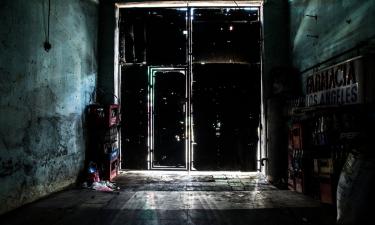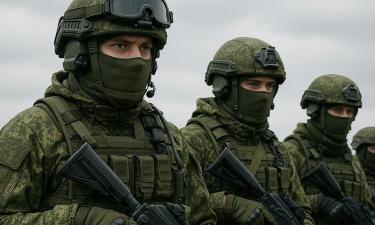Hank Hoffman: Free Speech, R.I.P.
The American Airlines ticket clerk at Bangor International Airport in Maine handed Nancy Oden her ticket. She had waited what she says was an "inordinate amount of time" while the ticket agent typed and responded to computer prompts. Oden thought it odd that the clerk never asked for any identification after she gave her name. It was Thursday, Nov. 1, and Oden -- a longtime peace and environmental activist, organic farmer and leader in Green Party USA (the more radical wing of the American Green movement) -- was heading for a party confab in Chicago. She was scheduled to speak the next night on biochemical warfare.
She never got there.
She believes she was prevented from flying because of her antiwar and activist politics. Oden's experience and the anecdotal accounts of political oppression from people like her across the country indicate we face the worst crisis in civil liberties in almost half a century.
After accepting her ticket, Oden noticed it was marked with a big "S." When she asked the clerk what the "S" stood for, he told her she had been picked to have her bags searched. That's fine, Oden thought. I'm as subject to a random search as the next person. But then she paused.
"I looked him in the eye and said, 'This wasn't random, was it?'" recalls Oden in a phone interview several days later. "He looked at me for a second and said, 'No, you're flagged in our computer. You were going to be searched no matter what.'"
It got worse. After passing through the X-ray machine without setting off any alarms, Oden settled herself in the boarding area. According to Oden, a young National Guardsman yelled at her to "Bring those bags over here!" and "Hurry up!" when she didn't move fast enough. When she reached out to help undo a recalcitrant zipper for one of the women searching her bags, the Guardsman barked, "Get your hands out of there!"
The National Guardsman then grabbed Oden's arm and started "spouting pro-war stuff in my face," she says. She found this odd. How did he know her antiwar views? She wasn't wearing any buttons.
"He went on and on, saying 'Don't you know we have to get them before they get us? Don't you understand what happened on Sept. 11?'"
She pulled her arm away, telling him he couldn't do that to her. She said to him, "I'm not going to stand here and listen to you about why we should bomb poor women and children and starving people in Afghanistan." He went to grab her again but she stepped back, saying, "Don't touch me."
The Guardsman would not let Oden board the plane, claiming she didn't cooperate with the search. Oden insists she did. At one point in the ordeal, the 61-year-old, conservatively dressed Oden was surrounded by six machine-gun-toting Guardsmen. The military men told all the airlines servicing the Bangor airport not to allow Oden to fly on that day (and possibly other days). An airport policeman escorted her off the premises.
According to a Nov. 3 report in the Bangor Daily News, American Eagle spokesman Kurt Iverson said Oden was "uncooperative during the screening process." Iverson charged that Oden would not stand still to have the metal-detecting wand waved over her. Oden acknowledges asking the officer not to touch her with the wand, but says she allowed a complete search of her person and baggage. She notes that refusal to cooperate with a search is a federal crime and she was not arrested.
According to the news report, authorities acknowledged that "Oden was singled out for added extensive screening," but said "it was more likely due to the manner in which she purchased her ticket than for her activist past." As an example, an unnamed airline official said that purchasing a ticket with cash on the day of the flight would raise a red flag.
Oden has never been arrested in 30 years of activism. She bought her ticket online six weeks in advance, using a personal credit card -- not a terrorist profile. She believes she was singled out for political reasons.
"The American people have to speak out. The military are in charge of our transportation," Oden says. "Each individual one of them is the law. Whatever they say, people have to do, no matter how insulting, idiotic, degrading or against the Constitution. It's the Bill of Rights I'm worried about."
Oden's ordeal isn't unique. The disturbing signs accumulate:
* Several hundred people have been detained secretly by the government since Sept. 11. A coalition of civil liberties, human rights and Arab-American groups charge that a growing number of reports "raise serious questions about deprivations of fundamental due process, including imprisonment without probable cause, interference with the right to counsel and threats of serious bodily injury." Kate Martin, director of the Center for National Security Studies, a Washington, D.C.-based group that seeks to balance national security concerns with civil liberties considerations, says the situation is "frighteningly close to the practice of 'disappearing' people in Latin America." While the comparison may be extreme, the policy of arresting people and spiriting them away to unknown places without access to lawyers and court appearances is unprecedented in contemporary America.
* As reported in the Philadelphia City Paper, Neil Godfrey, a 22-year-old Philadelphia man, was barred from a flight to Phoenix to visit his parents because officials didn't like his choice of reading material. Godfrey had a copy of the Edward Abbey novel Hayduke Lives!, about a radical environmentalist; the cover shows a man's hand holding sticks of dynamite. A National Guardsman questioned Godfrey on why he was reading it. About a dozen officers from airport, city and state police forces interrogated Godfrey for 45 minutes and pored over the book.
* Godfrey tells me he was scared: "If I said one wrong thing, I felt like I would be arrested." Although the police and military authorities cleared Godfrey to board, the airline would not permit him to fly.
* While the red, white and blue flourishes on school grounds, Katie Sierra, a West Virginia high school student, was barred from wearing a T-shirt bearing the message: "When I saw the dead and dying Afghani children on TV, I felt a renewed sense of national security. God Bless America." The school, upheld immediately by a state judge, would also not allow her to start a club promoting her anarchist views. According to an article by Michael Colby on Counterpunch.org, local Board of Education member John Luoni accused Sierra of "committing treason" for criticizing the war.
* Several nonviolent antiwar demonstrators arrested at an unpermitted march in Hartford on Oct. 25 were charged not with the usual misdemeanor offenses common in these instances but with felonies carrying multi-year prison terms on conviction. The bonds in some cases were set at punitive levels of $35-50,000. In court, during bail hearings, "The non-political defendants were muttering that the kids ought to be given 'life.' The prosecutors were in high dudgeon," recalls Norm Pattis, attorney for some of the protesters. Another person present at the hearings says the bail commissioner accused the protesters of "serious crimes, given the times we live in."
With the enactment of the Orwellian-named USA PATRIOT Act, these cancers on the democratic body politic threaten to metastasize. The new law grants law enforcement and intelligence agencies a decades-old wish list of surveillance and detention powers. It expands the ability of the government to conduct secret "black bag" searches. It restricts the oversight powers of the court system, a necessary check on the abuse of power. It creates a new crime called "domestic terrorism." The definition is so broad and vague that much legitimate dissent in this country could now be considered criminal.
And the hits just keep on coming. Frustrated by their inability to get some of the detainees to talk, the FBI has floated a trial balloon through sympathetic journalists and pundits that torturing prisoners or even suspects might be necessary. Gutting the principle of attorney-client privilege, Attorney General John Ashcroft approved a new rule allowing the government to listen in on the conversations lawyers have with clients in federal custody.
On Nov. 13, President Bush signed an executive order allowing special military tribunals, possibly operating in secret, to try foreigners charged with terrorism. Vice President Dick Cheney defended the policy. According to The New York Times, Cheney said terrorist suspects do not deserve the same guarantees of due process as American citizens. A military tribunal, Cheney said, "guarantees that we'll have the kind of treatment of these individuals that we believe they deserve." There's a term for the type of trial where the result is decided in advance: kangaroo court. Cheney, Ashcroft and others in the administration are asserting the prerogatives of dictatorship. We can, they are saying, bypass fundamental liberties, rule by executive order without consulting Congress and operate in secrecy.
The attack on fundamental liberties -- like the downturn in the economy -- didn't begin on Sept. 11. What changed with the attacks was the ability of the Bush administration to extend and codify their assault on democratic freedoms.
Over the past two years, the global justice movement, known in the mainstream press as the "anti-globalization movement," has been subjected to increasing official attacks. In Washington, D.C., during the April 2000 protests against the International Monetary Fund and World Bank, numerous federal and District of Columbia law enforcement agencies engaged in wholesale violations of civil liberties. They harassed activists on the street. They used conspicuous surveillance as an intimidation tactic. The protesters' headquarters was raided and closed on a flimsy fire code pretext. Later that same day, riot police trapped some 600 demonstrators. Closing off both ends of a city block without warning, the police penned the protesters -- who believed they were in a legal demonstration -- in the rain for two hours before arresting the lot of them. They were held with their wrists in plastic handcuffs and their arms behind their backs for periods of 10-17 hours.
The nonviolent civil disobedience that occurred the next morning -- blocking intersections to try to prevent delegates from getting to the IMF or World Bank meetings -- was met with targeted brutality rather than the indiscriminate police violence employed against World Trade Organization protesters five months previously in Seattle: pepper spray. Baton beatings. Charges into crowds with motorcycles and other vehicles. Protesters who were arrested on Sunday and Monday were subject to beatings and homophobic threats from police, guards and U.S. marshals. Over 1,000 people were arrested that weekend. There were no convictions on any charges other than misdemeanors.
Similar police violence, some of it provoked by undercover agents provocateur, took place against protesters outside last year's presidential nominating conventions, as well as at global justice demonstrations in Quebec City, Genoa, and Gothenburg, Sweden.
Michael Ratner, a human rights lawyer and vice president of the Center for Constitutional Rights, worries the type of scattershot repression witnessed the last two years may now be systematized. The key is the "domestic terrorism" provision in the USA PATRIOT Act. Under Sec. 802, domestic terrorism is defined as an activity that involves acts dangerous to human life that violate the laws of the United States or any of the individual states and appears to be intended to either "intimidate or coerce a civilian population," "influence the government by intimidation or coercion" or "affect the conduct of government by mass destruction, assassination or kidnapping." In addition, the government can now charge anyone who provides assistance to a person or organization charged with domestic terrorism.
Ratner notes as an example that the 1999 World Trade Organization protests in Seattle might fit the government's criteria (and it is the government that gets to slap on the "domestic terrorist" label). Blockading streets or breaking windows could arguably be acts "dangerous to human life" that are also illegal. The protesters were avowedly committed to "influence the policy of government."
Did you contribute to one of the protest organizations? Put up flyers or circulate e-mail promoting the actions? Provide lodging to an out-of-town demonstrator? Then you may be guilty of "providing material support" to terrorists. When one considers that a totally peaceful demonstration could be tarred by a police agent provocateur breaking a window -- it's been known to happen -- the potential for massive abuse is clear.
Or, how about this: U.S. Trade Representative Robert Zoellick has declared that granting the president streamlined authority to push through a new hemispheric trade deal is necessary in the battle against terrorism. Does that make fast-track opponents terror sympathizers?
"We're talking about probably the most serious moment I've seen except maybe the height of the McCarthy period in this country," says Ratner. "I think they're conceptualizing this as a permanent war against terrorism and using that as a way of undercutting democratic governance."
Kit Gage, director of the First Amendment Foundation, says the changes are "clearly comprehensive: legislative, executive orders, policy and procedure." Gage is also concerned about the expansion of secrecy and what is known as "court-stripping," or denying courts the power to oversee and approve or reject government actions. The essential checks and balances of court oversight, Gage argues, are being eviscerated when they are needed most.
"There is much more increased secrecy regarding what government can do, is doing and is authorized to do," says Gage.
The very concept of the right of the individual to have his or her day in court is under systematic attack. The edifice of due process protections is designed to curtail arbitrary and illegitimate exercises of authority. The idea is that if government officials or police believe they may have to answer for their actions in a court of law, they will be less likely to abuse their power. But now, officials need no longer justify their intrusions on privacy or personal freedom, or the bar is lowered or the definition of criminality made so broad as to be meaningless.
Nobody denies the need for security and precaution, for vigilance and law enforcement action to combat terrorism. But increasingly, if you look crosswise at the wrong official, you face the threat of being caught in the Kafkaesque web without rights or recourse.
If the government's raison d'кtre is to find and punish subversives, subversives will be found -- even if subversives end up being defined as anyone exercising a constitutional right to question the government. What looms before us is the possibility that the singular encounters with arbitrary authority of people like Nancy Oden, Neil Godfrey and Katie Sierra and all those held incognito may become the general experience of us all
http://www.alternet.org/tory.html?StoryID=11949
Subscribe to Pravda.Ru Telegram channel, Facebook, RSS!




